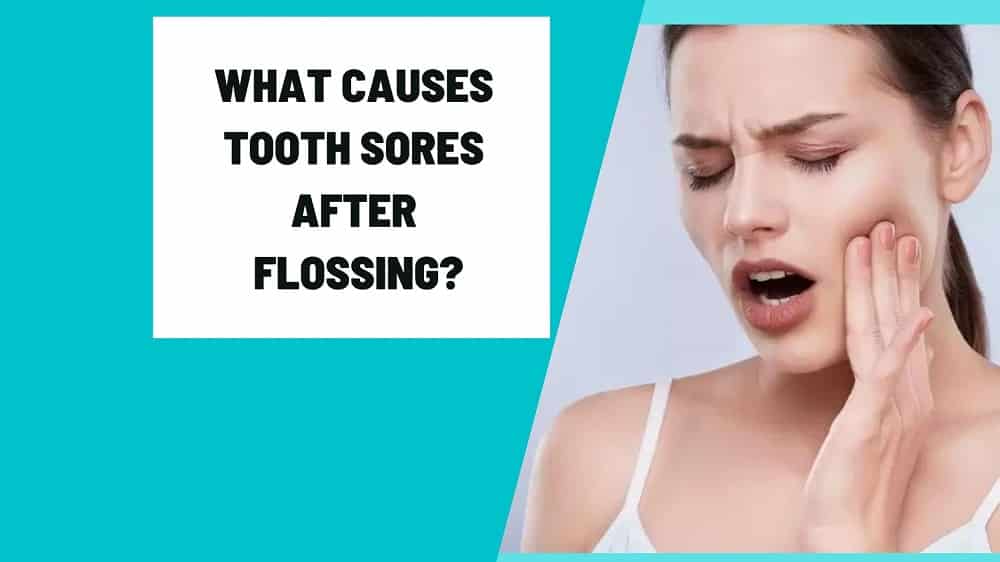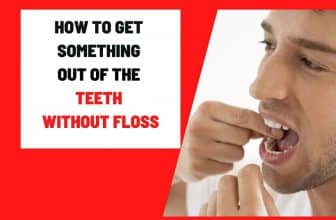
The use of improper tools and techniques is the most common cause of developing toothache or tooth sores when or after flossing.
However, you may experience tooth sores after flossing due to improper use of the tool and wrong techniques. Most people who suffer gum pain during or after flossing are those who are beginners.
The main aim of flossing is to remove debris and sticky plaque from your teeth; experiencing pain after flossing is rare and can be avoided by following the user’s instructions adequately.
Top 3 Picks Cordless Oral Irrigator Water Flosser
Can regular flossing cause toothache or tooth sore?
Yes. Frequent flossing would result in a toothache. From the research, this is the most common reason for oral pain after flossing.
You are recommended to floss once a day to avoid bruising the tooth wall, making the teeth sensitive.
Ensure to floss regularly to prevent plaque buildup once a day but don’t exceed once.
How do I floss to avoid tooth soreness?
- You avoid hard flossing.
- Try to consult your dentist before you plan to floss to avoid flossing decayed teeth.
- Try to seek your dentist’s advice before you go into flossing to avoid using the wrong flossing technique, especially if your teeth are sensitive.
NB; In this way, Your dentist will recommend you purchase an easily suitable flossing technique and ensure that you aren’t putting too much pressure on your gums when flossing. Following this guideline will prevent you from having a toothache or sore gum.
How do I floss properly to avoid toothache or gum sore?
- Firstly read and follow the user’s instructions carefully, and don’t floss aggressively.
- If you have had a tooth problem, please consult your dentist before undergoing flossing treatment.
- Ensure to use the right flossing tools.
- If you are experiencing tooth wall sensitivity or receded gum, floss gently and slowly to avoid bruising the area.
Can you hurt your tooth by flossing?
Yes. Flossing too aggressively or vigorously can actually cause damage to the tooth wall and damage the enamel of the teeth.
In fact, if flossing is done incorrectly, it can actually severely harm oral health.
How do you get rid of gum pain after flossing?
Here are some simple ways to get rid of painful tooth gums after flossing.
- Use warm and cold compresses, and it is an easy and a great way to relieve gum pain.
- You can rinse your mouth and take warm green tea instantly.
- Use a cotton wool ball and apply a drop of tea tree oil to the irritated gum.
- You can also apply turmeric paste for 30mins and rinse off.
- You can get the oral gel to soothe the gum.
- Get pain killers to relieve tooth pain.
Can You Damage Your Teeth By Flossing?
Yes. You can damage your teeth during flossing by Forcing the floss tool between your teeth, doing it hurriedly, and flossing too hard. You also can damage your tooth enamel and the gum tissues during the above process.
If you are flossing, do it calmly, there’s no need to rush; if not, you will use incorrect flossing techniques that can adversely affect your mouth.
However, receding gums can also expose the tooth roots to damage and sensitivity. That is why you need to floss carefully to avoid damaging your teeth.
When should I consult the dentist after flossing sore?
Furthermore, flossing is not supposed to be painful or cause unpleasant oral ache, and it becomes painful when you floss aggressively or use improper cleaning techniques.
One can also experience sore gum during flossing when you have tooth decay.
So Instead of flossing too hard, try to follow the user instructions and do it gentler in slower movements.
After you change your flossing approach, you are assured that the pain should go slowly, and you will no longer experience pain during flossing.
However, If the pain is severe and it persists, kindly consult with your dentist and find out whether you are facing a more complicated issue than regular flossing.
Should I floss if my gums are inflamed?
You can gently floss an inflamed tooth gum.
When flossing an inflamed gum, try to pass the tool gently and slightly around the mouth to avoid irritating the swollen gums.
However, If you get them more irritated, they will eventually lead to gum disease, which is dangerous to the oral.
You should rinse the mouth with lukewarm water and apply an oral soothing gel to calm the irritated gum after flossing.
Will flossing heal gums?
No. flossing a swollen tooth gum will help reduce the risk of bacteria buildup, leading to infections.
At this point, your gums might be susceptible and inflamed that they can’t handle anything harsh, so try to floss softly and slowly to avoid irritating the gum.
Top 3 Picks Cordless Oral Irrigator Water Flosser
Conclusion on what causes tooth sore after flossing
However, Regular flossing has lots of benefits, but for some people who might experience a toothache after flossing can be a rare downside using this oral care tooth.
As we all know, cleaning your teeth regularly is necessary to keep your mouth healthy and give you a confident, beautiful smile.
Hence most of us become eager to see the result and then begin to floss more once daily without following the user instructions proper and giving it much thought.
This is where some people get it wrong, and one might end up creating tooth pains problems out of curiosity.
However, some people deal with pain when flossing. Some people may use improper cleaning techniques and develop sore gum after flossing; those who didn’t notice or understand this may start condemning flossing.
However, flossing does not cause sore gum or oral pain, and the improper use of it develops tooth sensitivity or sore gum.
You can gently floss even when your tooth is inflamed, which will prevent bacteria from penetrating the gum.
As a beginner, you will eventually get used to it while following the instructions correctly. You advise consulting your dentist if you experience any severe toothache or gum pains.
References
How long does swollen gum last
https://www.winston-salemdentists.com/how-long-do-swollen-gums-last/
How to get rid of inflamed gums?










